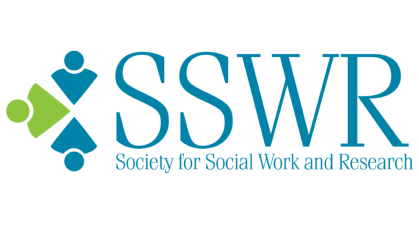Accordion Content
This fall, Rutgers School of Social Work welcomes five new students to its Ph.D. Program. We invite you to learn more about each student and their goals for their time at Rutgers.
-

Can you share a bit about your background in social work?
I'm a Licensed Social Worker (LSW) and have been working in the social work field for a little over a decade now. Much of my career has been in program coordination and workforce development for child- and family-support providers, with an emphasis on promoting diversity, equity, inclusion, and belonging.
What are your research interests?
In my doctoral research and beyond, I seek to explore global interpersonal violence prevention through family support methods for mitigating early childhood trauma, strengthening protective factors, and addressing the non-medical drivers of health, with a particular focus on workforce development to effectively implement these approaches.
Why did you choose to attend Rutgers School of Social Work?
I received my MSW from Rutgers SSW in 2015 and found my experience in the Masters program to be extremely meaningful. The community and support at Rutgers with such personable faculty members all inspired me to return for my Ph.D.Can you tell us about your most recent professional position?
Most recently, I was a Content Supervisor at the Institute for Families within the Rutgers SSW. I oversaw the training curricula for NJ's child welfare workers, and I led the design and development of NJ's new state Community Based Doula Certificate curriculum on behalf of the NJ Maternal and Infant Health Innovation Authority (NJMIHIA).
What do you hope to get out of the Ph.D. program?
John Lewis left us with the charge to "make some noise and get in good trouble, necessary trouble." My hope is that my time in the Ph.D. program will equip me with the skills needed to ask the hard questions, uncover truths, challenge the status quo, and advocate for justice. -
Can you share a bit about your background in social work?
I worked in the nonprofit space in social work adjacent jobs for nearly ten years before going back to school for my MSW. During my time in that program, I worked in refugee resettlement and later in individual and group therapy. I also became involved in social work scholarship as a curriculum and research assistant working on projects in economic justice and international child support policy.
What are your research interests?
I am most interested in the intersections of economic justice, social welfare policy, and immigration: basically, how can we shape policy to make our communities more welcoming to immigrants and ensure they receive the support they need to build the lives they want.
Why did you choose to attend Rutgers School of Social Work?
Because I love New Jersey. More seriously though, from my time working in NJ nonprofits through my time in the MSW program, I was always struck by how involved Rutgers is in NJ communities. Far from being a detached ivory tower, Rutgers is directly involved both through its scholarship and action in making NJ better, whether that's reducing food insecurity through SNAP education or advancing democracy through research on state ballot design. As someone who has chosen to live, work, and raise a family in NJ, Rutgers's commitment to our state resonates with me. The School of Social Work especially, seems to be a place where sound, rigorous research meets compassion and justice, and that is a place I want to be.
Can you tell us about your most recent professional position?
Most recently, I was a part time research assistant to Dr. Laura Cuesta at the Rutgers School of Social Work and a full time caregiver to my two zany kids (ages 4 and 1 1/2). For the former, I provided fact-checking, research, and editing support to several projects, including Child support policy in middle- and low-income countries: Current approaches and policy dilemmas (which was published in JICSP, vol. 39(1)) and a forthcoming paper in collaboration with the World Bank, Raising Children Alone in Latin America and the Caribbean: Strong Mothers and Weak Social Assistance. For the latter, I provided snacks. (Very) Prior to that, I worked as the Development Director for New Jersey Policy Perspective, a nonprofit leveraging research and data to advance progressive policy change. In that role, I was responsible for all grant writing and fundraising activities, as well as supporting the communications team in writing/editing anything from full research reports to blog posts.
What do you hope to get out of the Ph.D. program?
I hope to gain proficiency in the methods and analytical skills necessary to conduct rigorous research that advances human rights and dignity while building connections with other researchers and scholars engaged in this critical work. -

Can you share a bit about your background in social work?
I was inspired toward social work when I began working as a Case Manager with NYC emergency covid response services for those transitioning from carceral spaces. I sought to address the needs of the clients in a way that was culturally competent, and strength based, especially for my target population. I gravitated to the work and the social worker told me that I should consider social work. I did and the more I studied the more inclined I was to social work.
What are your research interests?
My research interests are in the collateral consequences of parental incarceration and whether it leads to behavioral problems such as generational incarceration. In addition, I am interested in substance use disorders and how it affects incarceration outcomes.
Why did you choose to attend Rutgers School of Social Work?
I researched Rutgers and saw that it was on par with the elite research universities. I also saw the in-house research centers that the university had which attracted me to the Rutgers School of Social Work. Most importantly, I choose Rutgers because of the stance they took towards the political pressures placed on universities, by the federal government.
Can you tell us about your most recent professional position?
I was a Director of Community Based Programs in East Harlem, where we provided case management, housing navigation, job development and work force facilitation.
What do you hope to get out of the Ph.D. program?
I hope to obtain my degree and do research that will effectuate change in our criminal legal system. -

Can you share a bit about your background in social work?
I have a lot of experience working with groups as a facilitator, with topics ranging from male privilege to transformative justice. I've also worked as a Data + Continuous Improvement Specialist for a nonprofit, and as an outpatient therapist providing individual psychotherapy for a wide range of clients. Most recently, I've worked with an organization called Men4Choice helping to activate, educate, and mobilize pro-choice men in the fight for reproductive freedom.
What are your research interests?
My research interests are around interpersonal + gender-based violence prevention and men + masculinities.
Why did you choose to attend Rutgers School of Social Work?
On my visit, I felt like I was able to really get to know the school, the faculty, and the current students. What stood out to me was how supportive of an environment Rutgers is. I left my visit feeling like I could see myself growing personally and professionally at Rutgers - I'm very happy with my decision.
Can you tell us about your most recent professional position?
Working as an outpatient therapist coming from doing data at a nonprofit was a bit of a 180, but that's one of the reasons why I love social work - there are so many different pathways. I enjoyed getting to know my clients and holding space for them and their truths. It was so rewarding to develop treatment plans and see clients respond positively. I did always feel like I could be doing more, though. My supervisor always reminded me that my job wasn't to be an advocate, even though my social work instincts always led me to do everything possible to support my clients.
What do you hope to get out of the Ph.D. program?
I want to learn how to conduct impactful research, which is what social work researchers do. -

Can you share a bit about your background in social work?
I earned my MSW with a focus on management and policy, and for the past four years I've served as Senior Project Coordinator at the Rutgers School of Social Work’s Center for Prevention Science, where I manage the Youth and Family Interview Team (YaFIT). In this role, I lead a large-scale qualitative program evaluation in partnership with the New Jersey Department of Children and Families, interviewing families involved in the child protection system and analyzing their experiences to inform continuous quality improvement.
What are your research interests?
I’m especially interested in child and family policy, including how programs like paid leave, child care access, and tax credits (EITC, CTC) shape family well-being. I’m also drawn to questions about how community and policy intersect in supporting parents and caregivers.
Why did you choose to attend Rutgers School of Social Work?
Rutgers stood out to me because of its strong commitment to policy-relevant research, its faculty expertise in child and family well-being, and its focus on translating research into practice and policy change.
Can you tell us about your most recent professional position?
I currently serve as Senior Project Coordinator with the Rutgers School of Social Work’s Center for Prevention Science. I manage the Youth and Family Interview Team, which conducts interviews with families involved in the child protection system, analyzes data, and produces findings to inform continuous quality improvement at the state level.
What do you hope to get out of the Ph.D. program?
Through the Ph.D. program, I hope to strengthen my research skills, deepen my understanding of social policy, and develop as an independent scholar. Ultimately, I want my work to inform policies that support families and promote child well-being at both state and national levels.



